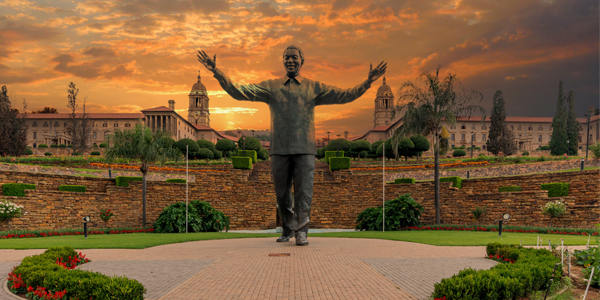A violent freedom
- Beth Amato
Despite the knife-edge upon which South Africans live, the country is not, in fact, a failed state – but a new form of democracy is required.

In July 2021, a profoundly unsettling eight days of violence, looting, and burning gripped South Africa. The media attributed these actions, which caused 340 deaths and around R50 billion in damage, to the imprisonment of former president Jacob Zuma, and the term ‘failed state’ was freely bandied around.
While Zuma’s arrest may have been a trigger, it was not the root cause of the revolt; the July riots were a symptom of a more significant historical crisis, and “patterns were only crystallised under Zuma,” explains Dr Edward Cottle, a researcher at the Southern Centre for Inequality Studies at Wits.
If Zuma was the spark, the pandemic was the wood – as was the government’s granting of a meagre R350 monthly social grant. Add in the lack of adequate housing, food, and jobs affecting many communities, and the tinder box was ready to blow. Not reckoning with unresolved issues relating to the country’s unjust past was the fuel, and the fire created a smokescreen for the repercussions of a macroeconomic model that believed a free market would address South Africa’s inequities, says Cottle.
“Before Mbeki’s drive for efficiency and the rationalisation of the economy, the Reconstruction and Development Plan, introduced in 1994, was a way for black people to partake in the economy.”
Furthermore, Mbeki’s growth, employment, and redistribution plan was not developed in meaningful partnership with labour and civil society. Cottle says, “Mbeki argued that local economic and political systems would become more efficient, decreasing debt levels. This never transpired.”
Fragile not failed
A failed state, by definition, is a place where the state cannot fulfill most of its functions. “It’s a war zone with no basic security or development,” says Cottle.
Despite the country’s dire socioeconomic and political realities, South Africa is not a failed state, “The concept is dated,” says Cottle. “It’s more plausible to say we are a fragile state.”
A fragile state can be defined as one that is in some form of crisis and is characterised by poor government performance.
Furthermore, South Africa is not unique if violent protests are an indicator of a fragile state. Violent urban uprisings have engulfed Europe, and the Middle East’s Arab Spring was also a seminal moment in the history of violent protests.
Polarisation versus democracy
“Democracy is perceived to be fraught with moral failings,” explains Dr Siphiwe Dube, a Senior Lecturer in Political Studies. “The growing conservatism across the globe is underpinned by the belief that ‘undeserving’ people are given rights.
Conservatives believe that the world has gone too far in accommodating and tolerating trans people, immigrants, those seeking abortions, anyone entering a same sex marriage, and so-called rampant feminists,” he says, and points out that in the US, right-wing demagogues espouse hatred and suspicion towards immigrants, but need the latter for cheap labour and to do the kind of work that others refuse to do.
African conservatism
Dube has researched the values and rhetoric of conservative South African political entities, particularly leading up to the 2024 elections. He has examined the Freedom Front Plus, Solidarity, the African Christian Democratic Party, and the African Transformation Movement. These organisations have different manifestos but common threads, says Dube, including the sanctity of the nuclear family, religion, and the entrenchment of patriarchy.
“These parties are saying we should have a new and totally different moral system. But there is such hypocrisy; these parties exist because of key Constitutional rights such as freedom of speech.”
Inkululeko – a new form of democracy
Dube believes that democracy must be reimagined. “When John Locke wrote about democracy, he was speaking only to an elite of white men who held the belief that liberal democracy was inherently good. We have to think about democracy in a way that promotes justice, effectively addresses polycrises, and shifts away from staunch positionality.”
Cottle asserts that a new political model must focus on delivering socioeconomic rights. “I believe we also need a firm review of our past. We can’t blame every failing on the government. We need to address the causes of increasing inequality. And this is not peculiar to South Africa.”
Dr Hlengiwe Ndlovu, a Senior Lecturer in the School of Governance, has delved into state and societal relations, and particularly the concept of inkululeko.
“This isiXhosa term is loosely translated as ‘freedom.’ Inkululeko is linked to the socioeconomic outcomes people expected from the fruits of the liberation struggle and the promise of a better life for all, as stated in the ANC’s 1994 election manifesto,” says Ndlovu, who conducted an ethnographic study in Duncan Village, East London, between 2014 and 2019, to understand what democracy and true freedom mean to people.
“While democracy is conventionally a system where people can elect their representatives and partake in decision-making, inkululeko is more tangible. It is being free from hunger, homelessness, and human indignity.”
- Beth Amato is a freelance writer.
- This article first appeared in Curiosity, a research magazine produced by Wits Communications and the Research Office.
- Read more in the 17th issue, themed: #Democracy, we turn to our academics and professional staff for their research, perspectives and commentary on both the progress and shortcomings in our democracy, and democracies elsewhere.

